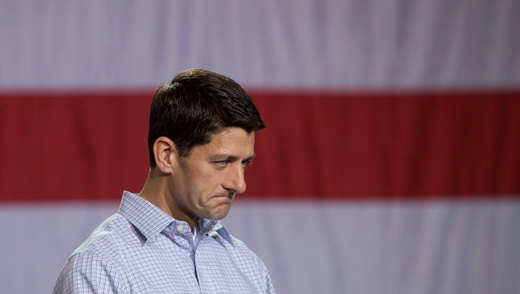As NDAA Poised For Veto, Ryan Challenges Intransigents
Posted on

Rep. Paul Ryan
WASHINGTON: What will happen if President Obama vetoes the National Defense Authorization Act? No one really knows.
We’ve pinged a number of experienced staff and other experts and no one really knows the likely consequences of a veto. It looks likely that troops will get paid, weapons bought, and operations paid for, albeit at lower levels than the Pentagon requested. But no one is quite sure.
“The department has depended on this bill… virtually since its inception,” one House Armed Services Committee staff member noted. “What are the unknown, unintended consequences of not having an authorization bill? We don’t know.”
While Republicans will try to override a veto, it’s not clear if they have the votes in the House. The aide points to the 10 GOP members who voted against the conference report.
A veto will definitely imperil the dramatic acquisition reforms the bill contains. That’s clear. “In addition to vital authorities that will expire at the end of the year, you have these landmark reforms, that are big bipartisan reforms that were not easy to do — acquisition reform and the pension and retirement reform chief among them — whose future then becomes uncertain,” the aide told Sydney. No one who has watched Congress for most of the last decade will have much confidence in its ability to pass a number of smaller bills containing these reforms.
Appropriators, Democrats, and some leaders in the House and Senate might argue that many of the policy prescriptions that deal with money can be folded into a Continuing Resolution or an omnibus appropriations bill, should Congress actually pass a defense spending bill. “If we don’t get an NDAA at all, then the critical authorities we renew every year could be done in an appropriations bill / CR [Continuing Resolution],” another Hill staffer told Sydney in an email. “None of the ‘new stuff’ would happen, but programs at their current levels, pay and benefits, etc. would be fine. The NDAA is an important bill, but not absolutely essential for the DoD to operate.”
That “new stuff” is some big stuff, however. Funding will remain at 2015 levels that the administration and pro-defense legislators in both parties have said are just too low. Measures to start new programs, to address large-scale policy issues such as those concerning Russia and the South China Sea, and anything that is strictly about policy would be highly unlikely to make it into either an appropriations bill or a CR: Congress has a deep-seated reluctance to make policy in a money bill.
For the record, two Republican presidents — George W. Bush and, yes, Ronald Reagan — have vetoed the NDAA. Bush did it in 2007; Reagan did it in 1989. The vetoes held but a different version of the Bush-era bill later passed.
All told, “the bill has been vetoed four times,” the HASC staffer said, “but they were always vetoed over discrete provisions,” sections of the bill that could be amended or removed in short order so the revised NDAA could be sent back to the president. The thing the president objects to this time, the use of Overseas Contingency Operations (OCO) funding to bypass Budget Control Act caps (aka sequester), is fundamental to the bill. There’s no easy way to excise it, even if Republicans wanted to. The simplest solution (simplest procedurally, not politically) would be to raise the caps. But the last time anyone managed to make a bipartisan compromise on caps — much to the dismay of Tea Party conservatives — was the landmark deal Sen. Patty Murray and Rep. Paul Ryan’s landmark struck in 2013.

Rep. Ryan and Democratic Sen. Patty Murray announce their landmark budget deal in 2013.
Paul Ryan vs. The Freedom Caucus
Today, Rep. Paul Ryan tossed down the gauntlet to the far right of his party, the Freedom Caucus, daring them to submit to the authority of the Speaker of the House or forego voting for him. The House, unlike the Senate, depends on the ruthless authority of the Speaker to drive the unwieldy pack he leads. Combine the Speaker’s powers with those of the House Rules Committee and you define how the House functions. Only those bills and debates of which the Speaker and the other majority leaders approve can move through the unruly body. The Freedom Caucus, unable to act as it wants, is trying to break the basic powers of the Speaker to allow for “greater democracy,” the rallying cry behind just about every ill-considered overhaul of congressional procedure since before Watergate.
Arguably, the 40-some members of that group have little interest in democracy and much in their power to impose their own vision of righteous governance. Ryan, the only GOP member likely to attract votes from across the Republican conference, has given them a stark choice: bend to the will of the party or I won’t accept the position of Speaker. That would leave the party and the House splintered and subject to the ills of faction just as the debt ceiling needs to be lifted and spending bills passed. Is the small faction willing to risk the country’s ill will should it succeed in crippling the government, or, as they put it, standing up for principle?
What message would that send to the voters come next November?
Subscribe to our newsletter
Promotions, new products and sales. Directly to your inbox.
